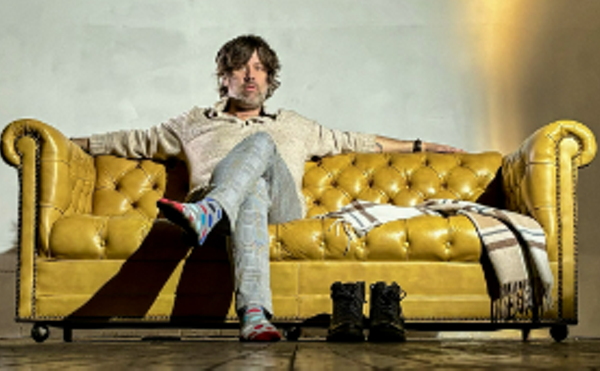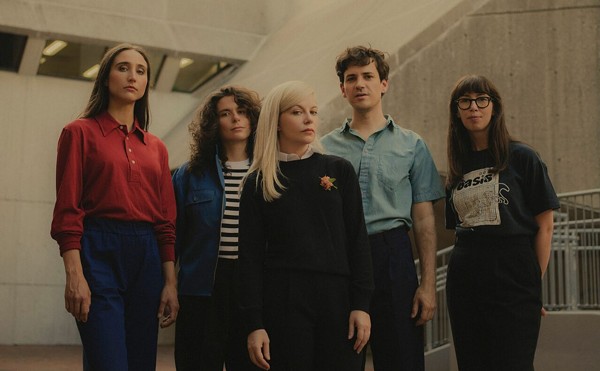Eddy "the Chief" Clearwater is a fifty-year veteran of the music business. Although regarded as a blues singer/guitarist, he has covered many bases over five decades. It's that versatility and eclecticism that has always enabled him to keep working, even though fame eluded him for so long.
And that nickname? Well, anyone who's seen Clearwater on stage knows why. He frequently arrives wearing a full Native American headdress, although Clearwater has no native ancestry in him. The feathered chapeau was a gift from a club owner, Pat Sweet, in the late 1970s.
"It was something I started doing to give my stage appearance more of an attraction," Clearwater says. "The first thing you have to do is get people's attention before you can sell them anything. I am trying to sell them my music. When they see me in the headdress, then I can give them my sales pitch."
"She [Sweet] gave it to me as a good luck charm," Clearwater adds. "I offered to buy it from her, but she said, 'I can't sell it. It was a gift from a reservation in Wyoming. I can't let it go.' But she said I could borrow it and wear it for luck if I promised to take care of it. I've taken good care of it."
Maybe it indeed has brought Clearwater luck, as his American recording career took off about that time. In 1979 he recorded an eclectic folk album, 2 X 9, for Charly Records. He went bluesier in 1980 with The Chief for Rooster Blues, an album that also featured harmonica star Carey Bell. Clearwater surfaced again in 1986 with Flimdoozie, on which Otis Rush is featured.
Clearwater's latest CD, Cool Blues Walk, is his second for Bullseye, coming on the heels of last year's Mean Case of the Blues.
Clearwater, 63, is one of the deans of the West Side Chicago blues scene, which arose in the late '50s and early '60s and also included Rush, Magic Sam Maghett, Buddy Guy, and Luther Allison. As more Southern blacks poured into Chicago after World War II, and more middle-class whites fled to the suburbs, the South Side, the traditional home to Chicago's blacks, could hold no more, and the West Side became increasingly congested. A new blues played by younger artists naturally arose.
"A lot of the West Side sound happened because of the clubs," Clearwater says. "The club owners wanted no more than three musicians. They didn't want to pay more than three guys, and their clubs were too small, anyway. You had five-piece bands playing on the South Side, but we had to make three sound like five."
The result was a guitar-heavy sound that combined the traditional Mississippi Delta South Side blues with the energy of the rock and roll that was starting to dominate the radio. It was perfect for Clearwater, who combined skilled playing with theatrics like playing his left-handed guitar upside down, behind his back, etc. He became as much of a draw for his stage presence as for his ability to make music.
Clearwater was born Edward Harrington in Macon, Mississippi. His first musical influences came from the radio, where he was exposed to the blues on the King Biscuit Flour Hour radio show, which featured the country of artists like Hank Williams and the gospel of singers such as Rosetta Tharp. His family moved to Birmingham, Alabama, when Eddy was thirteen, and the youngster started playing guitar in gospel groups. In 1950 he went to Chicago to live with his uncle, Houston Harrington, a record producer and itinerant preacher.
Clearwater began playing blues in earnest in 1953. He was known as Guitar Eddy, but changed his name to Clear Waters as a play on his idol Muddy Waters's (McKinley Morganfield) stage name. That was amended to Eddy Clearwater shortly thereafter.
Clearwater was already well-versed in blues, country, and gospel when yet another influence came his way. Hearing Chuck Berry's "Oh Baby Doll" pushed Clearwater to learn to play gritty rock and roll, as well as imitate Berry's duckwalk on stage.
"I like to do different things," Clearwater says. "I grew up listening to all kinds of different music. We had guys singing blues on the farm, when the corn was being planted or the cotton being picked. It was gospel in the churches, country in town. Being from the South, I got to hear it all. It's not like I hear somebody and say, 'I have to be like that.' I just have all these songs bouncing around in my head."
Clearwater slugged it out in small West Side clubs throughout the '60s. His sound and that of other West Siders can be heard on the Delmark compilation Chicago Ain't Nothing but a Blues Band. But it was his move to Europe that ignited Clearwater's career. He recorded his debut album, Black Night, for the French label MCM in 1976. Then came I Don't Give a Damn if Whites Buy It for England's Red Lightnin' label in 1977. That disc, ironically, won a W.C. Handy Award as Best Import Blues Album. But it got Clearwater his American recording deal.
Clearwater's stage awareness and wide musical repertoire have made him a club favorite ever since. Cool Blues Walk includes covers of Freddie King's "Sen-Say-Shun" and Willie Dixon's "I Just Want to Make Love to You." On his own compositions he pays homage to Chuck Berry ("Boppin' at the Top of the Rock"), country ("Nashville Road"), and New Orleans jazz ("Blues for a Living"). What we have isn't just another blues guitarist, but a consummate entertainer. And we aren't sorry about that, Chief.
Eddy Clearwater. 8 p.m., Sunday, January 3, Savannah Bar & Grille, 30676 Detroit Road, Westlake, 440-892-2266, $5











